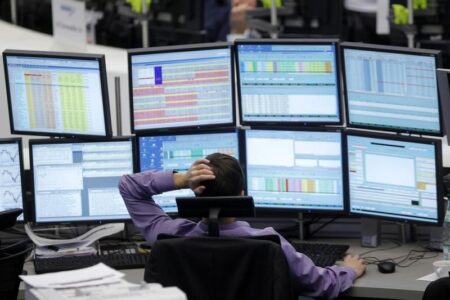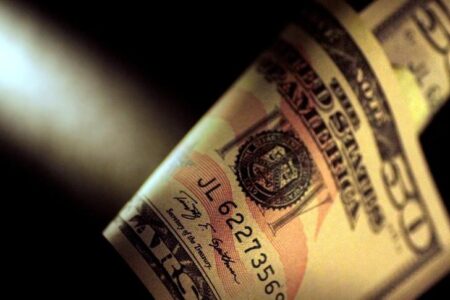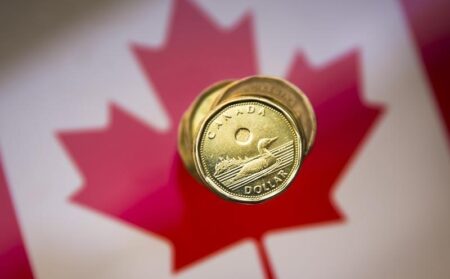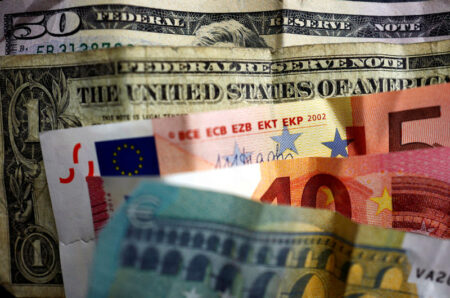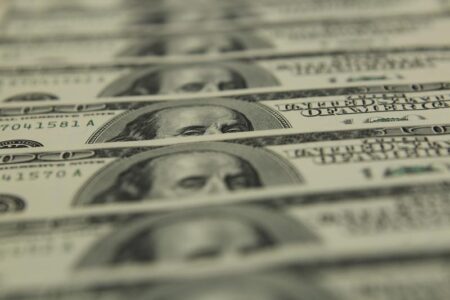By Gertrude Chavez-Dreyfuss and Saqib Iqbal Ahmed
NEW YORK (Reuters) -The dollar fell across the board on Thursday, as investors’ appetite for riskier currencies grew as they bet the Federal Reserve is done raising interest rates after holding them steady in the previous session.
The Fed left interest rates unchanged on Wednesday as policymakers struggled to determine whether financial conditions may be tight enough already to control inflation, or whether an economy that continues to outperform expectations may need still more restraint.
Investors, however, are increasingly convinced a peak in U.S. interest rates has been reached, with Fed funds futures sticking with a sub-20% chance that rates will rise in December.
That view helped boost investors’ risk appetite on Thursday, helping lift equities and high-yielding assets such as commodity and emerging market currencies.
Brad Bechtel, global head of FX at Jefferies in New York, said the Fed is probably finished hiking rates, but he could see the rationale for tightening one more time given the still-resilient U.S. economy.
“But at the same time, everyone is looking at a slowdown and inflation is going in the right direction,” Bechtel said. “We can kind of debate whether they would hike another 25 (basis points) or not. It doesn’t matter. The broader theme is that the Fed is pretty much near the peak.”
The , which measures the currency’s strength against a basket of six rivals, was 0.3% lower at 106.14.
“Markets were not pricing in any further tightening before yesterday so nothing changes there. But at the margin, a bit more conviction around the next move being a cut may be emerging,” Shaun Osborne, chief currency strategist at Scotia Bank, said in a note.
Sterling, meanwhile, rose after the Bank of England kept rates at a 15-year high and stressed that it did not expect to start cutting them any time soon.
The pound rose as much as 0.6% against the dollar to $1.2225, its highest level in 1-1/2 weeks after the BoE voted 6-3 to hold rates steady at 5.25%, while ruling out rate cuts anytime soon. Sterling was last up 0.4% at $1.2201.
The Australian dollar, often used as a proxy for risk appetite, jumped 0.54% on Thursday, while the New Zealand dollar rose 0.8%.
Norway’s central bank also left its benchmark rate unchanged, as widely expected, but said it would likely raise borrowing costs next month unless inflation showed a continued decline.
The dollar was 0.2% lower against the Norwegian crown to 11.16.
Against the yen, the dollar fell 0.3% to 150.44, off a one-year high touched earlier this week.
The yen has been struggling for traction, even as the Bank of Japan on Tuesday made another relaxation of its yield curve control policy.
A fall to a one-year low of 151.74 per dollar and 15-year low of 160.83 per euro after the BoJ’s announcement had traders on watch for possible intervention to prop up the currency.
Kazuo Ueda, the central bank’s governor, will continue to dismantle its ultra-loose monetary policy and look to exit the decade-long accommodative regime sometime next year, sources told Reuters.
, slipped 1.7% to $34,836, after hitting an 18-month high of $35,968 earlier in the session.
Read the full article here





